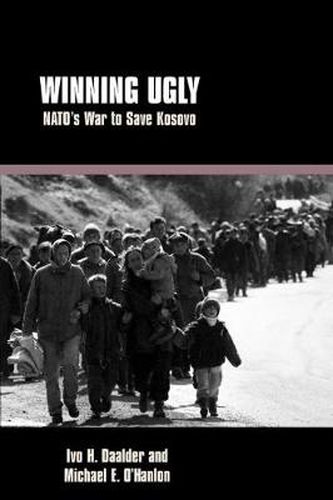Readings Newsletter
Become a Readings Member to make your shopping experience even easier.
Sign in or sign up for free!
You’re not far away from qualifying for FREE standard shipping within Australia
You’ve qualified for FREE standard shipping within Australia
The cart is loading…






After eleven weeks of bombing in the spring of 1999, the United States and NATO ultimately won the war in Kosovo. Serbian troops were forced to withdraw, enabling an international military and political presence to take charge in the region. But was this war inevitable or was it the product of failed western diplomacy prior to the conflict? And once it became necessary to use force, did NATO adopt a sound strategy to achieve its aims of stabilizing Kosovo?
In this first in-depth study of the Kosovo crisis, Ivo Daalder and Michael O'Hanlon answer these and other questions about the causes, conduct, and consequences of the war. Based on interviews with many of the key participants, they conclude that notwithstanding important diplomatic mistakes before the conflict, it would have been difficult to avoid the Kosovo war. That being the case, U.S. and NATO conduct of the war left much to be desired. For more than four weeks, the Serbs succeeded where NATO failed, forcefully changing Kosovo’s ethnic balance by forcing 1.5 million Albanians from their home and more than 800,000 from the country. Had they chosen to massacre more of their victims, NATO would have been powerless to stop them. In the end, NATO won the war by increasing the scope and intensity of bombing, making serious plans for a ground invasion, and moving diplomacy into full gear in order to convince Belgrade that this was a war Serbia would never win.
The Kosovo crisis is a cautionary tale for those who believe force can be used easily and in limited increments to stop genocide, mass killing, and the forceful expulsion of entire populations. Daalder and O'Hanlon conclude that the crisis holds important diplomatic and military lessons that must be learned so that others in the future might avoid the mistakes that were made in this case.
$9.00 standard shipping within Australia
FREE standard shipping within Australia for orders over $100.00
Express & International shipping calculated at checkout
After eleven weeks of bombing in the spring of 1999, the United States and NATO ultimately won the war in Kosovo. Serbian troops were forced to withdraw, enabling an international military and political presence to take charge in the region. But was this war inevitable or was it the product of failed western diplomacy prior to the conflict? And once it became necessary to use force, did NATO adopt a sound strategy to achieve its aims of stabilizing Kosovo?
In this first in-depth study of the Kosovo crisis, Ivo Daalder and Michael O'Hanlon answer these and other questions about the causes, conduct, and consequences of the war. Based on interviews with many of the key participants, they conclude that notwithstanding important diplomatic mistakes before the conflict, it would have been difficult to avoid the Kosovo war. That being the case, U.S. and NATO conduct of the war left much to be desired. For more than four weeks, the Serbs succeeded where NATO failed, forcefully changing Kosovo’s ethnic balance by forcing 1.5 million Albanians from their home and more than 800,000 from the country. Had they chosen to massacre more of their victims, NATO would have been powerless to stop them. In the end, NATO won the war by increasing the scope and intensity of bombing, making serious plans for a ground invasion, and moving diplomacy into full gear in order to convince Belgrade that this was a war Serbia would never win.
The Kosovo crisis is a cautionary tale for those who believe force can be used easily and in limited increments to stop genocide, mass killing, and the forceful expulsion of entire populations. Daalder and O'Hanlon conclude that the crisis holds important diplomatic and military lessons that must be learned so that others in the future might avoid the mistakes that were made in this case.